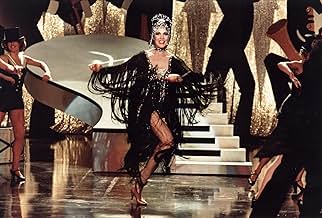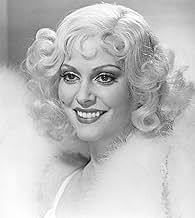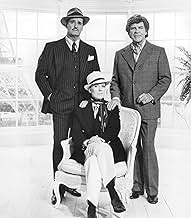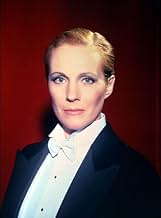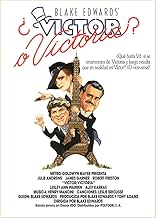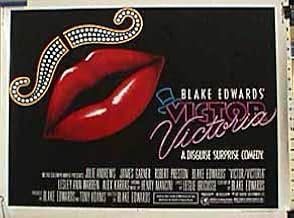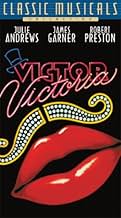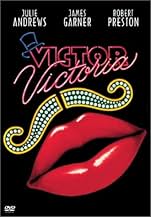IMDb-BEWERTUNG
7,6/10
24.710
IHRE BEWERTUNG
Eine sich durchs Leben kämpfende Sopranistin findet Arbeit als vorgeblicher männlicher Damenimitator, was jedoch ihr privates Leben erheblich erschwert.Eine sich durchs Leben kämpfende Sopranistin findet Arbeit als vorgeblicher männlicher Damenimitator, was jedoch ihr privates Leben erheblich erschwert.Eine sich durchs Leben kämpfende Sopranistin findet Arbeit als vorgeblicher männlicher Damenimitator, was jedoch ihr privates Leben erheblich erschwert.
- Regie
- Drehbuch
- Hauptbesetzung
- 1 Oscar gewonnen
- 11 Gewinne & 18 Nominierungen insgesamt
Herb Tanney
- Charles Bovin
- (as Sherloque Tanney)
Matyelok Gibbs
- Cassell's Receptionist
- (as Matyelock Gibbs)
Empfohlene Bewertungen
Despite all of its gender-bending commentary on sexuality, both hetero- and homo-, "Victor/Victoria" looked and sounded in 1982 (year of "ET" and "The Road Warrior") as if it were made in 1962 -- and that was a good thing. Blake Edwards' trademark ability to combine lush romanticism with immitable slapstick comedy was here matched by a wonderful score by his longtime collaborator Henry Mancini, "Voila!" -- we're back in the early sixties again. (It didn't hurt that stars Julie Andrews and James Garner were hottest in the sixties, and had acted together in 1964's "The Americanization of Emily.")
Robert Preston, "The Music Man" of late fifties Broadway and 1962 screen fame, further added an element of early sixties nostalgia -- with the twist that he here used his booming vocal tones in the service of a delightfully out and comfortable gay man. Preston was one of two hot contenders for the Best Supporting Actor Oscar that year. The winner was Lou Gossett, Jr. for his Drill Instructor in "An Officer And A Gentleman."
Rounding out the great cast are Lesley Ann Warren (sexy and very funny) in an Oscar-nominated role as Garner's mob moll floozie, and Alex Karras, continually funny as Garner's softhearted ox of a bodyguard. (Karras gets a classic Blake Edwards slapstick routine trapped in the freezing snow outside a Paris hotel, getting big laughs out of the simple line: "You've got heat? That's good.")
And be sure to keep a lookout for "Sherloque Tanney" as the French private detective on Victor/Victoria's trail. Tanney was Blake Edwards dentist, and appeared in almost every Blake Edwards film from "Darling Lili" (1970) on. Other than his corpse in "SOB," (1981), the French detective is possibly Dr. Tanney's greatest role on the screen. Tanney, too, gets to anchor several great trademark Blake Edwards slapstick routines.
Oh, and there's music, too. Enough music for a Broadway musical (which is what "Victor/Victoria" became), and with a sad and wistful Mancini title tune (reprised in the film by Andrews) that reminds one a bit of "Moon River" and "Days of Wine and Roses." Just like in the early sixties.
Robert Preston, "The Music Man" of late fifties Broadway and 1962 screen fame, further added an element of early sixties nostalgia -- with the twist that he here used his booming vocal tones in the service of a delightfully out and comfortable gay man. Preston was one of two hot contenders for the Best Supporting Actor Oscar that year. The winner was Lou Gossett, Jr. for his Drill Instructor in "An Officer And A Gentleman."
Rounding out the great cast are Lesley Ann Warren (sexy and very funny) in an Oscar-nominated role as Garner's mob moll floozie, and Alex Karras, continually funny as Garner's softhearted ox of a bodyguard. (Karras gets a classic Blake Edwards slapstick routine trapped in the freezing snow outside a Paris hotel, getting big laughs out of the simple line: "You've got heat? That's good.")
And be sure to keep a lookout for "Sherloque Tanney" as the French private detective on Victor/Victoria's trail. Tanney was Blake Edwards dentist, and appeared in almost every Blake Edwards film from "Darling Lili" (1970) on. Other than his corpse in "SOB," (1981), the French detective is possibly Dr. Tanney's greatest role on the screen. Tanney, too, gets to anchor several great trademark Blake Edwards slapstick routines.
Oh, and there's music, too. Enough music for a Broadway musical (which is what "Victor/Victoria" became), and with a sad and wistful Mancini title tune (reprised in the film by Andrews) that reminds one a bit of "Moon River" and "Days of Wine and Roses." Just like in the early sixties.
Three of the stars of this movie all made their mark playing wholesome characters, (and all in musicals, ironically) but they certainly got rid of those personas in this film. Julie Andrews finally solved the problem of Maria by playing a woman pretending to be a man pretending to be a woman, Robert Preston's gay entertainer is a long, long way from Harold Hill, and Lesley Ann Warren... well, her floozy moll ("Ya mean you really aw... quee-uh?") basically erases all memories of Cinderella. All give excellent performances in this entertaining, funny film from director/co-writer Blake Edwards. And they all get to sing some great songs from Henry Mancini and Leslie Brucusse, among them "Le Jazz Hot," (in which Andrews sings in her lower range, and actually sizzles) "The Shady Dame From Seville," (first sung by Andrews, then hilariously reprised at the end by Preston) and "Chicago, Illinois." (Warren is great in that) Though there is a long stretch in the middle that either included jokes and/or subtleties that went over my head or just wasn't funny, though not bad, otherwise it's a great comedy. In addition to the three performers mentioned, James Garner is also good as the gangster who falls for Andrews but is unsure of her gender.
Paris in the '30s is the setting for this screwball sex comedy wherein JULIE ANDREWS, for the sake of being employed, takes a job as a woman pretending to be a man pretending to be a woman--figure that one out. Then we have a great moment when ROBERT PRESTON does an imitation of Julie singing "The Shady Dame from Seville" in drag--yes drag--the actor who played such sturdy romantic leads in the '40s and '50s is hilarious as a gay blade who hooks up with Julie during a restaurant scene in which she plants a cockroach in her plate to avoid paying for dinner.
That's the kind of romp this is. And it's extremely witty, with JAMES GARNER as Julie's romantic interest who hasn't figured out why he's so attracted to "the shady dame" when she's supposed to be a man.
First-rate sets and cinematography in color, and while none of it really makes any sense, the song and dance routines are fabulous with some great tunes by Henry Mancini. LESLEY ANN WARREN gives a priceless performance as a bird brained vamp in her Oscar nominated supporting role.
That's the kind of romp this is. And it's extremely witty, with JAMES GARNER as Julie's romantic interest who hasn't figured out why he's so attracted to "the shady dame" when she's supposed to be a man.
First-rate sets and cinematography in color, and while none of it really makes any sense, the song and dance routines are fabulous with some great tunes by Henry Mancini. LESLEY ANN WARREN gives a priceless performance as a bird brained vamp in her Oscar nominated supporting role.
Ever since I heard about "Victor Victoria", I tried to visualize how a movie from Blake Edwards, "The Pink Panther" director, about cross-dressing in 1930s "Gay Paris" would look. My intuition was that the film would either be a period version of French comedy hit "La Cage aux Folles" (or its American remake "The Birdcage") or something in the more realistic vein of Bob Fosse's "Cabaret". Where does "Victor Victoria" stand between these classics?
In fact, these comparisons though valid (a hilarious gag involving a popping champagne seems to have been borrowed from the French classic) are marginal when confronted to the musical's satirical edge and the way it handles an important subject like gender roles, so fitting from the same year that provided "Tootsie" or "The World According to Garp". In "Tootsie", an Oscar-nominated Dustin Hoffman played a man who learned the ordeal of being a woman trying to fit in a male-driven world, and in the latter, John Littgow was Oscar-nominated for playing an ex-football athlete who became Roberta, the sweetest and most complex character of the film.
So, the 1982 Oscar wasn't a "drag-race" but an interesting year that questioned for the first time the kind of stuff that was usually taken for granted: men and women were different... as if they were supposed to be identical within their respective gender.
This is why you can't cover issues like men and woman's relationship or feminism without inevitably spreading it to homosexuality, gender identity and stuff that are compacted today into initials. While the notion of LGBTQ etc. wasn't as socially preeminent in 1982, there was a Gay culture nonetheless dating back to history and that found a "micro-Golden Age" in the interwar period (they weren't called "Les Années Folles" for nothing) as if Europe, worn down by endless battles down the mud, wanted jazz, swing, love and a little "je ne sais quoi" of eccentricity, living life like a cabaret in Berlin, puttin' on the Ritz in Paris or putting the "Chic" in Chicago! "Victor Victoria" takes this context into consideration, respects its audience's maturity and portray homosexuality in the most straightforward way.
So Blake Edwards lays the cards with the first shot where we see Toddy (Robert Preston) sleeping, face in profile, and then a man's head rises behind him. We understand the relationship is purely sexual, neither of them is pulling a "birdcage" and the thought that the film would indulge to such portrayals vanished instantly. Edwards finds the perfect way to put the viewers at ease, even those who can be 'bothered', he just shows from the start without sugarcoating or overplaying it. I don't mean he's "throwing" it at our faces so we're "done with it", in fact, just like heterosexual love, homosexuality is displayed within numerous layers: physical, emotional, platonic etc. In fact, sometimes, you feel like both loves are intertwined.
Take that scene for instance where King Marchand, James Garner as a charming but roguish American business, gets smitten by the new sensation of Gay Paris, look at how his jaw slowly drop when "Victoria" (Julie Andrews) puts off her apparel revealing short hair, which means that she's "Victor", which means a transvestite. At the same moment, Norma, Marchand's ditzy moll, played by a scene-stealing Lesley Ann Warren goes from bitter jealousy to ecstatic cheerfulness. That simple scene seems to show how truly insecure gender issues made 'average' persons feel ... maybe was it a nod to the audience?
Or maybe the bottom-line is that only someone with the true sensitivity of an artist would be able to question the way laws of attractions function for him or her. Look at the transvestite numbers, they're sophisticated, elegant, they do involve men but they actually put femininity into a true pedestal, the approach is equally in adoration of the woman figure than any proud macho. And once again, this 'relativeness' goes the same way around, when Julie Andrews plays the man and asks herself how she can be credible, Toddy reassures her, there's no proper way to be a man, she's just got to pretend to be some Polish count so the suspicion won't dig further than that lie (pretty smart actually).
It turns out that the best way to be a man is just not to be too feminine enough to never give up the illusion entirely, one must know it's a man for the sake of the show's own "reason-to-be". Interestingly, the notion of man is less sexualized than the woman, if you compare it to the overly sexy "Chicago" song performed by Norma. The exhilaration of being a man is played outside the realm of show-business, like a reverse "Tootsie", the way Victoria finds all door opens once she becomes a man. But see how once again King Marchand gets so obsessed by her impersonation and defensive about his manhood, many of his actions are less guided by love than his macho pride, which is saying a lot.
I might have been too analytical for a film that is essentially an entertaining, moderately eccentric, but ultimately fun story about fun-loving and sympathetic people... but I was surprised by how enjoyable it was. And just when I tried to predict some situation, something funnier or smarter or more touching came all the way, like that bit involving Marchand's bodyguard Squash (Alex Karras) that I didn't see coming.
Now, to say that "Victor Victoria" has a message would be too far-fetched but it does say something about gender and life in general: we take ourselves too seriously and anyone should be free to do whatever he loves... the film embraces its own approach by injecting a fair dose of slapstick (well, I think there was one or two brawls too many) but the Edwards' touch, the 'atmosphere', the casting (especially Preston and Warren) not to mention the musical, contribute to a spectacular and solid entertainment, that aged up very well like some good Parisian wine.
In fact, these comparisons though valid (a hilarious gag involving a popping champagne seems to have been borrowed from the French classic) are marginal when confronted to the musical's satirical edge and the way it handles an important subject like gender roles, so fitting from the same year that provided "Tootsie" or "The World According to Garp". In "Tootsie", an Oscar-nominated Dustin Hoffman played a man who learned the ordeal of being a woman trying to fit in a male-driven world, and in the latter, John Littgow was Oscar-nominated for playing an ex-football athlete who became Roberta, the sweetest and most complex character of the film.
So, the 1982 Oscar wasn't a "drag-race" but an interesting year that questioned for the first time the kind of stuff that was usually taken for granted: men and women were different... as if they were supposed to be identical within their respective gender.
This is why you can't cover issues like men and woman's relationship or feminism without inevitably spreading it to homosexuality, gender identity and stuff that are compacted today into initials. While the notion of LGBTQ etc. wasn't as socially preeminent in 1982, there was a Gay culture nonetheless dating back to history and that found a "micro-Golden Age" in the interwar period (they weren't called "Les Années Folles" for nothing) as if Europe, worn down by endless battles down the mud, wanted jazz, swing, love and a little "je ne sais quoi" of eccentricity, living life like a cabaret in Berlin, puttin' on the Ritz in Paris or putting the "Chic" in Chicago! "Victor Victoria" takes this context into consideration, respects its audience's maturity and portray homosexuality in the most straightforward way.
So Blake Edwards lays the cards with the first shot where we see Toddy (Robert Preston) sleeping, face in profile, and then a man's head rises behind him. We understand the relationship is purely sexual, neither of them is pulling a "birdcage" and the thought that the film would indulge to such portrayals vanished instantly. Edwards finds the perfect way to put the viewers at ease, even those who can be 'bothered', he just shows from the start without sugarcoating or overplaying it. I don't mean he's "throwing" it at our faces so we're "done with it", in fact, just like heterosexual love, homosexuality is displayed within numerous layers: physical, emotional, platonic etc. In fact, sometimes, you feel like both loves are intertwined.
Take that scene for instance where King Marchand, James Garner as a charming but roguish American business, gets smitten by the new sensation of Gay Paris, look at how his jaw slowly drop when "Victoria" (Julie Andrews) puts off her apparel revealing short hair, which means that she's "Victor", which means a transvestite. At the same moment, Norma, Marchand's ditzy moll, played by a scene-stealing Lesley Ann Warren goes from bitter jealousy to ecstatic cheerfulness. That simple scene seems to show how truly insecure gender issues made 'average' persons feel ... maybe was it a nod to the audience?
Or maybe the bottom-line is that only someone with the true sensitivity of an artist would be able to question the way laws of attractions function for him or her. Look at the transvestite numbers, they're sophisticated, elegant, they do involve men but they actually put femininity into a true pedestal, the approach is equally in adoration of the woman figure than any proud macho. And once again, this 'relativeness' goes the same way around, when Julie Andrews plays the man and asks herself how she can be credible, Toddy reassures her, there's no proper way to be a man, she's just got to pretend to be some Polish count so the suspicion won't dig further than that lie (pretty smart actually).
It turns out that the best way to be a man is just not to be too feminine enough to never give up the illusion entirely, one must know it's a man for the sake of the show's own "reason-to-be". Interestingly, the notion of man is less sexualized than the woman, if you compare it to the overly sexy "Chicago" song performed by Norma. The exhilaration of being a man is played outside the realm of show-business, like a reverse "Tootsie", the way Victoria finds all door opens once she becomes a man. But see how once again King Marchand gets so obsessed by her impersonation and defensive about his manhood, many of his actions are less guided by love than his macho pride, which is saying a lot.
I might have been too analytical for a film that is essentially an entertaining, moderately eccentric, but ultimately fun story about fun-loving and sympathetic people... but I was surprised by how enjoyable it was. And just when I tried to predict some situation, something funnier or smarter or more touching came all the way, like that bit involving Marchand's bodyguard Squash (Alex Karras) that I didn't see coming.
Now, to say that "Victor Victoria" has a message would be too far-fetched but it does say something about gender and life in general: we take ourselves too seriously and anyone should be free to do whatever he loves... the film embraces its own approach by injecting a fair dose of slapstick (well, I think there was one or two brawls too many) but the Edwards' touch, the 'atmosphere', the casting (especially Preston and Warren) not to mention the musical, contribute to a spectacular and solid entertainment, that aged up very well like some good Parisian wine.
Many social innovations, have often as not originated in France. Take cross-dressing for instance. In the 1930's a singer created quite a sensation when her fabulous show became the toast of Paris. She traveled throughout Europe and remained a novelty for years. Her success was due to the fact that she was not a woman after all. She was a man. This fact became the inspiration for the film "Victoria/Victoria." In the movie, a talented female singer (Julie Andrews) named Victoria Grant (aka Count Victor Grezhinski) schemes with an out of work cabaret singer, Carroll 'Toddy' Todd (Robert Preston, who is fantastic in this role) to create a female impersonation act. With the help of Andre Cassell, (John Rhys Davies) a night club owner they hope to get rich with the unusual act. Complications arise however, the least of which is a visiting gangster named King Marchand (James Garner) who takes a liking for Victoria. His Chicago girlfriend Norma Cassady (Lesley Ann Warren) become jealous and informs other hoodlums to come to Paris. Alex Karras, plays Mr. Bernstein, Garners' bodyguard). The film is a solid hit for the cast and lays the foundation of it become a classic. ****
WUSSTEST DU SCHON:
- WissenswertesJulie Andrews' performance of "Le Jazz Hot," along with the verisimilitude of her performance generally, was made possible by her four octave vocal range, which allowed her to sing the low notes of a male tenor to the high notes of a female soprano with smooth transitions.
- PatzerWhen King turns on the radio, the sound comes on right away. In the old vacuum tube radios of the day, the filaments of the tubes would have to warm up before any sound emanates.
- Crazy CreditsThe opening credits are a montage of Art Deco illustrations, with most of them reflecting the functions of the credited persons.
Top-Auswahl
Melde dich zum Bewerten an und greife auf die Watchlist für personalisierte Empfehlungen zu.
- How long is Victor/Victoria?Powered by Alexa
Details
- Erscheinungsdatum
- Herkunftsländer
- Sprachen
- Auch bekannt als
- Віктор Вікторія
- Drehorte
- Produktionsfirmen
- Weitere beteiligte Unternehmen bei IMDbPro anzeigen
Box Office
- Bruttoertrag in den USA und Kanada
- 28.215.453 $
- Eröffnungswochenende in den USA und in Kanada
- 139.634 $
- 21. März 1982
- Weltweiter Bruttoertrag
- 28.229.440 $
- Laufzeit2 Stunden 14 Minuten
- Farbe
- Sound-Mix
- Seitenverhältnis
- 2.35 : 1
Zu dieser Seite beitragen
Bearbeitung vorschlagen oder fehlenden Inhalt hinzufügen





